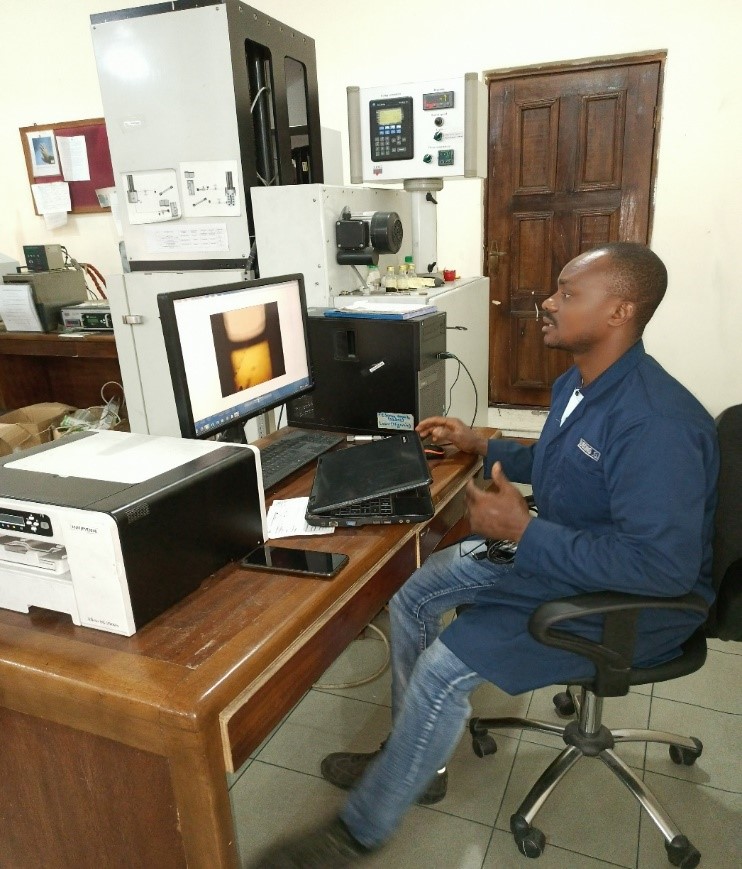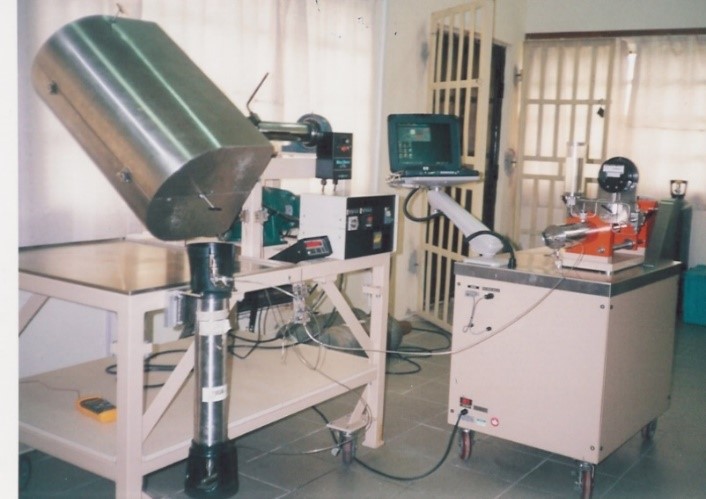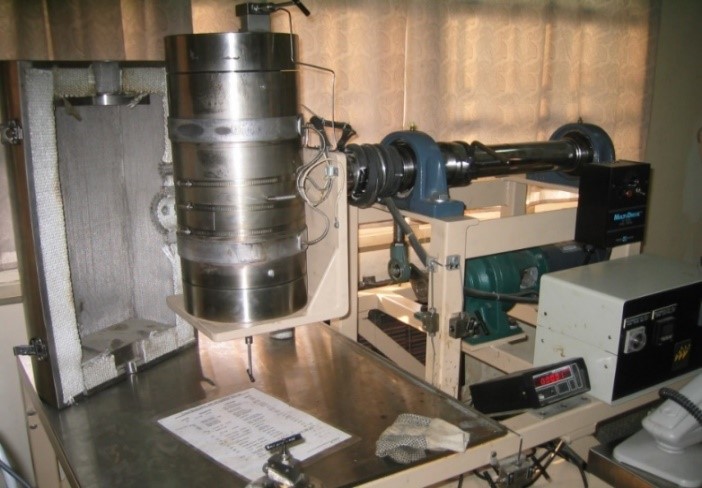PVT LABORATORY
Laser Engineering PVT (Pressure-Volume-Temperature) Laboratory is an ISO 9001:2005 and ISO/IEC 17025:2017 certified laboratory that has been in the business of providing fluid characterization and flow assurance solutions in the oil and gas industry for over twenty years. As the first mercury-free PVT laboratory in the West Africa sub-region, we offer a comprehensive range of standard testing services with our state-of-the-art equipment, ensuring quality and timely delivery of jobs. Below is a list of our equipment and services we render.
Hydrocarbon Fluid Sampling
This involves obtaining a representative sample of the formation fluid for PVT analysis or other analysis. Sampling involves the use of specialized cylinders, equipment and tools depending on the type of sampling. Laser Engineering provides both surface and sub-surface sampling services according to best industry practice.
Surface Hydrocarbon Fluid Sampling
For sampling of fluids which are collected at the well head or the production line for one phase flow (rarely), or at the separator (gas and oil). Sufficient samples can be collected for PVT analysis and/or other studies.

Surface Sampling Process
Sub-surface Hydrocarbon Fluid Sampling
Sub-surface or bottom hole sampling involves capturing reservoir fluid samples in-situ at reservoir conditions. Bottom-Hole sampling tools can be conveyed downhole via the following methods:
- Wireline
- Drill string
- Coiled tubing
This is the best sampling method for heavy oils as it eliminates issues with slow dissolution of gas from the oil. It is also suitable for fluids from reservoirs with hydrocarbon solid deposition tendencies.


Bottom Hole Sampling Equipment
Sample Storage and Handling
Laser Engineering provides a safe and controlled environment for sample storage in compliance with regulations and standards, ensuring that sample is stored safely and handled properly when not in use.

Hydrocarbon Fluid Compositional Analysis
Gas chromatography separates and analysis the components of hydrocarbon mixture based on their boiling points and affinity for stationary phase. This gives the molecular compositions and as well as provide other properties of the fluids. Laser Engineering has Gas Chromatograph equipment for liquid and gas analysis.

Agilent Gas Chromatograph
Oil and Gas Condensate PVT Studies
PVT study is a very important aspect of oil and gas reservoir management and evaluation. In this studies, the behavior of fluid under different pressure and temperature conditions are determined. Results from this studies provides the physical properties of reservoir fluids, helps calculate the amount of hydrocarbons in place and recoverable reserves and also help to design optimal production strategies. Very important properties provided by the PVT studies are saturation pressure (bubble point pressure for oils and dew point pressure for gas condensate samples), compressibility and viscosity. This is done using high pressure and high temperature PVT Cells. Laser Engineering currently boast of world class PVT cells for these studies one of which is shown below. PVT analysis done include the following:
- Hydrocarbon Fluid Compositional Analysis
- Flash Liberation
- Constant Composition Expansion (CCE)
- Differential Liberation (DL)
- Constant Volume Depletion (CVD)
- Separator Test
- Viscosity Test-
At Laser Engineering, our state-of-the-art laboratory and expert team are dedicated to delivering reliable PVT data on hydrocarbon samples ranging from Heavy Oil to Dry Ga. Other major equipment for PVT analysis include recombination system, gas chromatograph, etc. Also, we have equipment for measuring other properties of fluids which include density meter, viscometer, gasometer, etc.
Flow Assurance Studies
Flow Assurance Studies are studies done to ensure safe and efficient transportation of hydrocarbons from the reservoir to the processing facility. This include identifying potential flow assurance issues that could restrict hydrocarbon mobility, prevent unnecessary downtime, prevent accidents and ensure the safety of personnel, equipment and the environment thereby ensuring optimal production rates. The studies include predicting the likelihood of hydrate formation, wax deposition, asphaltene deposition, scale and emulsion formation. Laser Engineering is adequately equipped with manpower, equipment and simulators to carry out these studies. Equipment for flow assurance studies include the PVT cells, Reservoir Fluid Particle (RFP) Analyzer, Gas chromatograph (GC), Solid Detection System, etc.
Oil Fingerprinting/Geochemical Analysis
Petroleum geochemistry is a cost effective and concise approach that deals with the application of geological and chemical principles to the study of petroleum (oil and gas) origin, generation, movement, accumulation and alteration along with the application of this knowledge in oil and gas exploration and production.
At Laser Engineering, we employ industry recognized standards and best practices in carrying out these services using Gas Chromatograph-Flame Ionization Detector (GC-FID) and Gas Chromatograph-Mass Spectrometry (GC-MS) techniques with appropriate software (Chemstation and pIGI).
Gas Chromatograph-Flame Ionization Detector (GC-FID)
Gas Chromatograph-Mass Spectrometry (GC-MS)
We take advantage of the crude oil geochemical analysis in the following applications:
- Exploration: With the proper diagnostic ratios, we will be able to provide our clients with the following exploratory information:
- Environment of deposition
- Thermal maturity
- Extent of biodegradation
- Kerogen type
- Migration path way
- Whole oil geochemistry using GC-FID
- Biomarkers analysis of fractions (Hopanes, Steranes, and Terpanes) using GC-MS.
- Reservoir and Production Management
- Composition and properties of crude oil
- Crude oil production allocation for surface and subsurface commingled production systems
- Reservoir Communication and Compartmentalization
- Crude Oil Characterization for Refining and Processing
- Detailed Hydrocarbon Analysis on Cuts to ascertain their respective Paraffins, Naphthenes and Aromatics (PNA)
- Methanol in crude oil
- Product purity/quality
4) Forensic/Investigative Studies: In the event of oil theft or spill, we employ geochemical technique to ascertain the culprit.
5) Environmental Studies: Environmental impact assessment on a spilled site before and after remedial exercise.
Comprehensive Crude Assay Analysis/Refined Petroleum Product Analysis
Crude assay analysis is a process used to characterize the properties of crude oil. The data from crude assay analysis helps in understanding the quality, composition and potential value of the crude, which is essential for refining processes and marketing valuation.
The initial phase of crude assay analysis involves separating the crude petroleum into a number of different boiling point ranges or cuts, through batch distillation process. Our semi-automated TBP (D2892) and Potstill (D5236) distillation equipment with dehydration unit delivers efficient separation for all crude petroleum and condensate samples.
At Laser Engineering, our state-of-the-art laboratory and expert team are dedicated to delivering reliable data on whole crude and detailed crude assay analysis. Our laboratory is ISO 9001-2015 certified and ISO 17025-2017 accredited. Some of the parameters we deliver in our crude assay analysis are yield mass/volume (TBP distillation), D86 distillation, density, API gravity, specific gravity, water and sediment in crude oil, refractive index, RON, cetane number, cetane index, water content by Karl Fisher, k-factor, hydrocarbon composition, pour point, cloud point, sulfur in crude, viscosity, Reid vapour pressure, aromatics, olefins, saturates, smoke point, flash point, etc. Some crude assay equipment are given in table below.
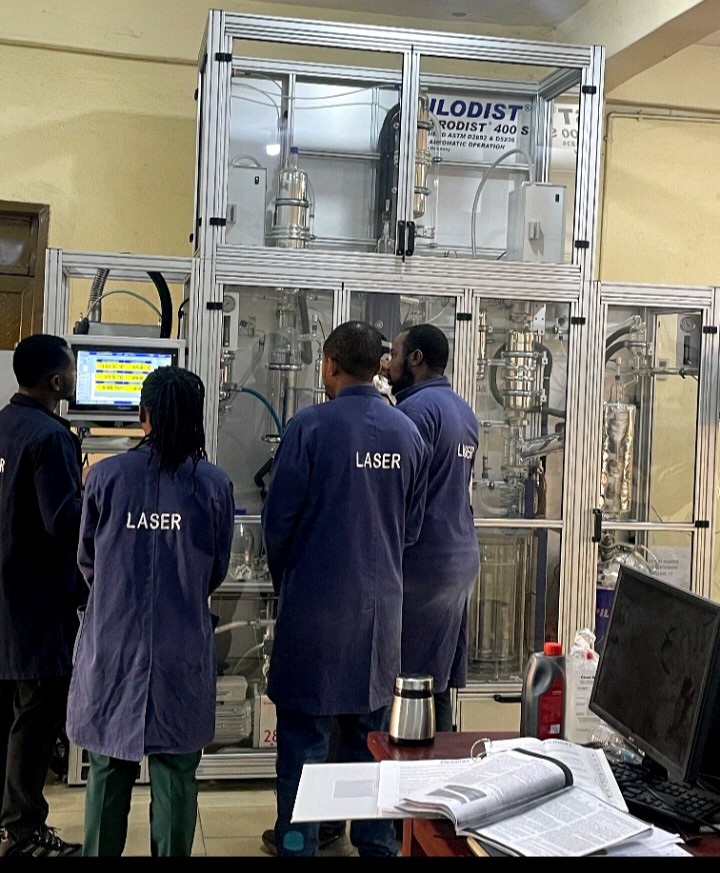
Pilodist Fractional Distillation Unit
For fractional distillation of crude oil samples
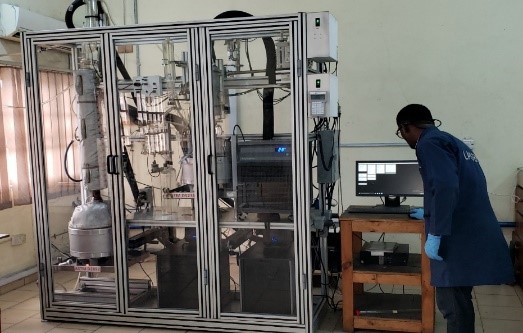
BR Instrument Fractional Distillation Unit
For fractional distillation of crude oil samples
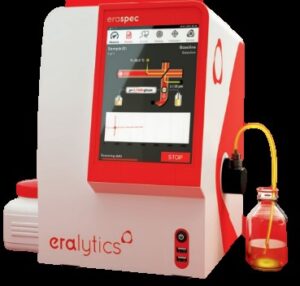
Eraspec Multi-fuel Analyser
For determination of a wide range of parameters including:
- Cetane number
- Cetane index
- Research octane number (RON)
- Oxygenates & esters
- Oxygen content
Motor octane number (MON)
Gas Assay Analysis
Gas assay analysis involves determination of gas compositions and other parameters for quality control, pricing, pipeline transportation, environmental monitoring and industrial processes. This involves analysis of the hydrocarbon components (C1-C10), non-hydrocarbon components such as CO2 (a greenhouse gas affecting gas heating value), N2 (inert gas affecting gas heating value), H2S (toxic gas requiring removal for safety and environmental reasons), mercaptan, water vapor, carbonyl sulphide, mercury, etc. Other properties of gas determined include water dew point, hydrocarbon dew point and water/moisture content. These analyses are done onsite and at our laboratory employing the gas chromatograph, moisture analyzers, stain tubes (Gastec and Drager), etc.

